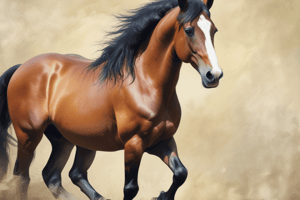Podcast
Questions and Answers
What are the key factors that influence the horse-human bond?
What are the key factors that influence the horse-human bond?
Trust, communication, emotional connection, and shared experiences
What is the primary focus of positive reinforcement training?
What is the primary focus of positive reinforcement training?
Rewarding desired behaviors with positive outcomes
What is the goal of desensitization and counterconditioning in horse training?
What is the goal of desensitization and counterconditioning in horse training?
Reducing fear and anxiety responses to stimuli
What are the benefits of a strong horse-human bond?
What are the benefits of a strong horse-human bond?
What is the purpose of mental preparation and visualization in horse training?
What is the purpose of mental preparation and visualization in horse training?
What is the primary principle of operant conditioning in horse training?
What is the primary principle of operant conditioning in horse training?
Flashcards are hidden until you start studying
Study Notes
Horse-Human Bond
- The horse-human bond is a complex and multifaceted relationship between horses and humans.
- Key factors influencing the bond:
- Trust: built through gentle, consistent, and positive interactions.
- Communication: horses respond to body language, tone of voice, and clear cues.
- Emotional connection: horses can sense human emotions and respond accordingly.
- Shared experiences: mutual activities and routines strengthen the bond.
- Benefits of a strong horse-human bond:
- Improved performance and responsiveness
- Increased trust and cooperation
- Reduced stress and anxiety
- Enhanced welfare and well-being
Psychological Strategies to Improve Performance
- Positive Reinforcement Training: focuses on rewarding desired behaviors with positive outcomes, such as treats or praise.
- Encourages learning and motivation
- Reduces anxiety and stress
- Increases confidence and trust
- Desensitization and Counterconditioning: exposure to stimuli in a controlled, gradual manner to reduce fear and anxiety responses.
- Effective for overcoming phobias or fears
- Improves calmness and focus in performance
- Mental Preparation and Visualization: techniques to prepare the horse for performance, such as visualization, breathing exercises, and relaxation techniques.
- Enhances focus and concentration
- Reduces stress and anxiety
- Improves performance under pressure
- Operant Conditioning: uses consequences, such as rewards or punishment, to modify behavior.
- Effective for shaping specific behaviors
- Can be used in conjunction with positive reinforcement training
- Social Learning Theory: horses learn by observing and imitating others, including humans.
- Important for socialization and training
- Can influence behavior and performance
Studying That Suits You
Use AI to generate personalized quizzes and flashcards to suit your learning preferences.




